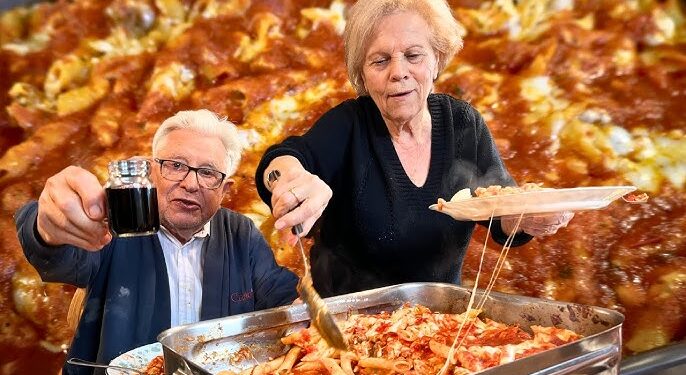In a world where culinary trends shift rapidly, there is a timeless figure that continues to inspire generations, ignite appetites, and preserve heritage—the Nonnas. Known as the grandmothers of Italian families, Nonnas are more than just elderly women cooking pasta in rustic kitchens. They are storytellers, teachers, caretakers, and most importantly, the guardians of Italy’s rich food culture.
The word “Nonna” (plural: “Nonnas”) is the Italian term for grandmother, but its meaning extends far beyond familial connection. It is a title of endearment, reverence, and cultural pride. Across Italy and among Italian communities around the world, Nonnas have become iconic symbols of authenticity, love, and generational wisdom.
The Origins of the Nonna Figure in Italian Society
To understand the significance of Nonnas, one must first grasp the foundational role of family in Italian life. For centuries, Italian culture has been centered on la famiglia—the family. Within this framework, the Nonna holds a pivotal place. Traditionally, she is the matriarch of the household, offering guidance, discipline, and most notably, food.

Historically, Italy was an agrarian society, where survival depended on shared knowledge and practical skills. Nonnas were the custodians of recipes passed down orally for generations. These dishes were created from simple, accessible ingredients, reflecting regional availability and seasonal produce. Whether it was Tuscan ribollita, Neapolitan ragu, or Sicilian arancini, the Nonna’s kitchen was a hub of local flavor and culinary storytelling.
Culinary Legacy: Recipes That Tell Stories
Each Nonna carries a treasure trove of culinary secrets—techniques not found in cookbooks or cooking shows, but learned through hands-on experience and years of repetition. These recipes are rarely written down, relying instead on intuition: “a pinch of this,” “a splash of that,” “until it smells right.”
Their dishes often go far beyond mere sustenance. A Nonna’s cooking is an act of love and remembrance. It connects family members to their ancestors, their land, and their identity. Food becomes a bridge between generations, linking a child’s future to their grandmother’s past.
One of the most iconic examples is handmade pasta. From rolling fresh dough to forming intricate shapes like orecchiette or tortellini, the ritual of pasta-making is a sacred act in many Italian homes. For a Nonna, teaching her grandchild to knead dough or stir risotto is a rite of passage—a way of ensuring that cultural memory survives.
Nonnas in the Modern World: A Cultural Revival
In recent years, the figure of the Nonna has made a surprising resurgence in global pop culture and digital media. From viral YouTube cooking channels to bestselling cookbooks, Nonnas have found a new audience far beyond Italy’s borders.
One such example is the wildly popular social media series “Pasta Grannies,” which documents real-life Italian Nonnas making traditional dishes in their home kitchens. The series has not only amassed millions of views but also sparked renewed interest in authentic, slow cooking at a time when fast food and convenience meals dominate.
Another example is the restaurant trend celebrating “Nonna-style” cooking. Restaurants around the world now boast menus inspired by the homestyle dishes of Italian grandmothers, with some even hiring real Nonnas to serve and cook. This movement isn’t just about food—it’s about experience, emotion, and a return to authenticity.
Even in fashion and advertising, Nonnas have become symbols of warmth, wisdom, and timeless charm. Luxury brands like Dolce & Gabbana have featured Nonnas in campaigns, celebrating their natural beauty and cultural importance.
Beyond the Kitchen: Nonnas as Cultural Icons
While their culinary contributions are perhaps most celebrated, Nonnas represent something even deeper in Italian and global consciousness. They are pillars of resilience, having lived through wars, economic hardships, and societal shifts. Their stories often involve sacrifice—raising large families, working long hours, and preserving traditions in times of upheaval.
In Italian diaspora communities, especially in the United States, Canada, and Australia, Nonnas played a crucial role in helping families assimilate while keeping their heritage alive. They organized family gatherings, taught Italian language and customs to grandchildren, and maintained links with relatives back in Italy.
Their influence extends into values and social customs. Nonnas teach respect, discipline, and the importance of togetherness. Sunday dinners, religious celebrations, and family rituals often revolve around the Nonna’s home—a testament to her central role in family life.
The Digital Nonna: Embracing Technology
Surprisingly, many Nonnas have embraced the digital age. Whether it’s via Instagram, YouTube, or TikTok, they’re connecting with younger audiences and spreading traditional knowledge in new ways. Their sincere, no-frills approach to cooking offers a refreshing alternative to curated food content.
Take, for instance, the phenomenon of TikTok-famous Nonnas who share quick videos of themselves making classic Italian dishes. Their charm, wit, and no-nonsense style captivate millions, and in the process, they preserve endangered recipes and techniques for future generations.
This digital visibility has also had a heartwarming impact—encouraging young people to reconnect with their own grandparents, ask questions, record stories, and most importantly, cook together.
Why the World Still Needs Nonnas
In today’s fast-paced, hyperconnected world, the spirit of the Nonna offers something increasingly rare: authenticity, patience, and continuity. Their homes are havens of stability in changing times. Their food nourishes not only the body but the soul. Their wisdom—gained through decades of life experience—is invaluable.
As societies become more individualistic, the presence of the Nonna reminds us of the value of intergenerational bonds. She teaches us that tradition isn’t about looking backward, but about carrying something forward. She shows us that love can be tasted in a sauce stirred slowly for hours and that memory lives on in flour-dusted hands and handwritten recipes.
Final Thoughts: Honoring the Nonnas
Whether biological or adopted, Italian or otherwise, Nonnas are universal figures of strength and tradition. Their stories and skills are threads in the larger tapestry of human culture. By honoring them—culturally, socially, and even digitally—we ensure that their legacy endures.
So the next time you enjoy a homemade lasagna, knead pasta dough, or smell simmering tomatoes on the stove, take a moment to thank the Nonnas. For without them, the world would be a little less warm, a little less flavorful, and a lot less connected to its roots.






























